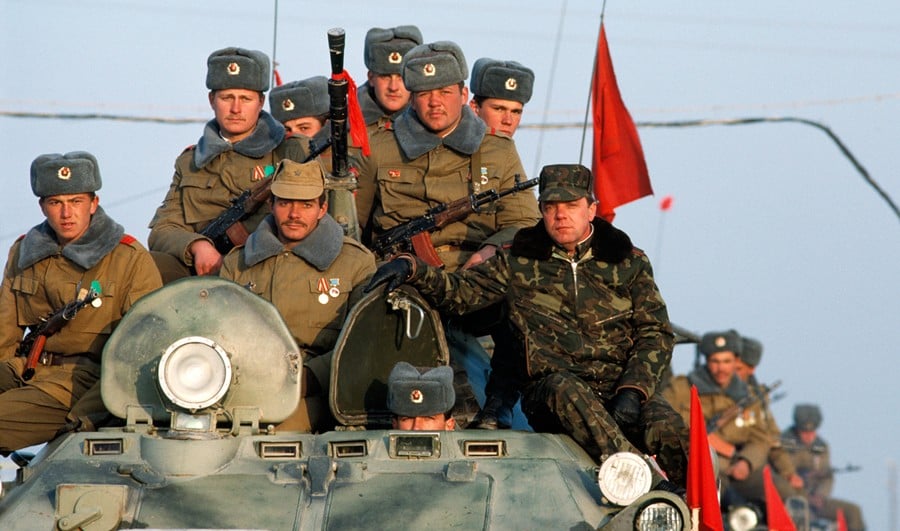
The haunting repercussions of Soviet Union’s invasion of Afghanistan

December is a gloomy month for Afghanistan and Pakistan. One day in the cold winter of December 1979, the now defunct Soviet Union decided to send troops to Afghanistan to help its allies, the putative ‘godless’ and tottering ‘Marxist’ PDPA (People Democratic Party of Afghanistan) regime against the rising tide of Islamists who were once considered by the US as the "moral equivalent of the American forefathers".
The decision of sending Red army to Afghanistan unleashed an unending series of unfortunate events that bled the region and confronted the denizens of this part of the world with untold hardships. It was not perhaps in the distant thoughts of the myopic Soviet leadership that their "folly" would not only bring about the demise of Soviet Union itself but would earn for Afghanistan the ‘coveted’ epithet, the "graveyard of empires".
What were the repercussions of their miscalculated decision for Soviet Union and the world at large is beyond the scope of this piece of writing. However, what are its consequences for Afghanistan and Pakistan have unfolded themselves over the years and still unfolding in Afghanistan and Pakistan. Ask a common man on the street and he would hold the Cold War and its concomitant Afghan Jihad responsible for whatever wrong/terror-related activities are happening in their land.
Being a student of history, I have yet to figure out who should be blamed for all this mess and chaos -- the Soviets, the Americans, the Afghans, the Pakistanis, the geography, or the ambitions of the two world hegemons (the USSR and the US)? Nonetheless, the saga started with Soviet arrival in Afghanistan.
It was the peak of the Cold War that Sardar Daud Khan, the then president of Afghanistan, visited Moscow where he was lectured by the Soviet leadership not to allow the Americans and its allies in Afghanistan for the exploration what the Communist considered to be spying in their strategic ‘backyard’. The lewany (hot-tempered) Daud Khan was displeased by the Russian intrusive behaviour what he called interference in their internal affairs. He came out of the remaining meeting angrily, "thumping the desk" and by disregarding the diplomatic niceties. On one hand, Daud Khan signed his own "death warrant" by doing so and on the other, provided Russians with the long-cherished opportunity to reach the warm water -- the southward drive since Czarist Russia.
According to some sources it was the US security advisor Brezenski’s plot to entrap Russians in Afghanistan to settle its score for Vietnam humiliation. However, there is a strong belief that Russia was trying not only to reach the much hyped warm water (Gwadar Port of Pakistan) but also to choke the maritime lifeline of the western/capitalist world (the nemeses of the communist).
Pakistan under Bhutto worked as catalyst and precipitated the crises which had its own axe to grind in order to blunt Sardar Daud’s support for the Pakistani nationalists (Pashtuns and Baloch) with Islamists proxies. The super power rivalry under the generic of Cold War had already exposed Pakistan’s susceptible position to centrifugal and fissiparous tendencies on December 16, 1971. Now it was another December and another Muslim country to bear the consequences of cold war.
After a bloody fight with the US-funded Mujahideen for less than a decade, the Russians realised their mistake that they were fighting in a wrong place and for a lost cause. Russia withdrew while leaving Dr. Najibullah regime high and dry and Afghanistan bleeding. What happened in the wake of Russian’s withdrawal, as they say, is history.
The saga that started in December 1979 has a deep connection with the brutal carnage on December 16, 2014 in Army Public School, Peshawar. The horrifying APS event inflicted such scars that would never be healed and the month of December would always haunt. The real and befitting tribute to the martyr of APS and the best commemoration would be to address the causes and plug the dykes of terror that gush forth the merchants of deaths. The key in my opinion is good neighbourly relations between Pakistan and Afghanistan and India. At the end, if I have to figure out at all the many questions/causes I have cited above, the real malaise seems to be bad relations between them.